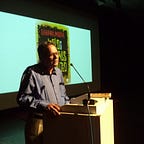Oliver Shiny’s Short Fiction: A Critique
My own experience is that once a story has been written, one has to cross out the beginning and the end — Anton Chekov
Oliver, as I have already told you, I read your story twice, the second time for figuring out what I failed to figure out the first time.
As a piece of writing, it’s tight, well-honed and cerebral — the kind of thing I like to read. Even as a short fiction, it touches me at places. But is it good fiction?
Let us begin at the beginning and proceed systemically.
Your title: Free Will at the low, Low cost of Unspent time. This is a long, lousy title for a short fiction. It’s off-putting for most readers. It’s atrocious. It reeks of your almost banal world-view and intellect. I would love to have a short, catchy title for it.
First paragraph :Like dad always says: You’ve always got a choice. Just because choosing one way will get you fired doesn’t mean you don’t have a choice.
Very smart indeed. I don’t even mind your hero being his dad’s son. But, shit, you show me your intellectual power again. You think you’ve won me over with a well-written aphorism like this. But I’m really miffed. I suspect you’ve no story to tell. Why don’t you come down straight to the business of introducing us to your protagonist or setting or whatever? I would like you to cross out this paragraph.
The story: an office, cubicles, keyboards clicking, bullying boss, female colleague. Nicely done. Then we see Evan, our hero, keeping busy typing things from Macbeth in his office. Interesting, but it’s weird at the same time. It’s after all a workplace and he’s supposed to do his duty. Anyway, we understand he’s bored and has no real work to do. Fine. But what is his background and family life like? Has he got a girl-friend to meet after office hours? No hints/clues except that dad thing. The real world is missing from your story. Your Macbeth-loving hero is not a right fit for a realistic fiction. You have to re-configure your hero, and make him more down-to-earth and even if he loves Macbeth, hide it from your readers.
Consistency and Momentum: when Art, Evan’s manager, comes down to Evan, he doesn’t so much as look at what Evan is doing. Just think of Art catching Evan in the act of typing Macbeth and reacting! The story could have an interesting twist and had a momentum. This momentum is vital for fiction.
But nothing happens in your story. It falls flat on its face. (why do you have such a funny name, Art, for a manager? I know you’re using it as an irony. But it didn’t work.)
I should stop here, but before I leave, I’ve got something to tell you by way of suggestion.
Writing good fiction is tough, very tough. You have strong command over words, but you need raw life experiences and minute observations about life to succeed in it.
Too much intellect stands in the way of writing fiction.
You should get out of your intellectual cocoon to take in the ambiance of the real world, look around, meet common men and study their lives with empathy and then sit down to write another fiction.
And you must dump your hubris and smartness for the sake of great fiction.
